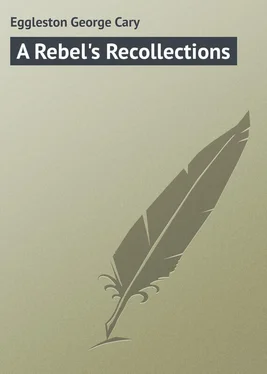George Eggleston - A Rebel's Recollections
Здесь есть возможность читать онлайн «George Eggleston - A Rebel's Recollections» — ознакомительный отрывок электронной книги совершенно бесплатно, а после прочтения отрывка купить полную версию. В некоторых случаях можно слушать аудио, скачать через торрент в формате fb2 и присутствует краткое содержание. Издательство: Иностранный паблик, Жанр: foreign_prose, на английском языке. Описание произведения, (предисловие) а так же отзывы посетителей доступны на портале библиотеки ЛибКат.
- Название:A Rebel's Recollections
- Автор:
- Издательство:Иностранный паблик
- Жанр:
- Год:неизвестен
- ISBN:нет данных
- Рейтинг книги:5 / 5. Голосов: 1
-
Избранное:Добавить в избранное
- Отзывы:
-
Ваша оценка:
- 100
- 1
- 2
- 3
- 4
- 5
A Rebel's Recollections: краткое содержание, описание и аннотация
Предлагаем к чтению аннотацию, описание, краткое содержание или предисловие (зависит от того, что написал сам автор книги «A Rebel's Recollections»). Если вы не нашли необходимую информацию о книге — напишите в комментариях, мы постараемся отыскать её.
A Rebel's Recollections — читать онлайн ознакомительный отрывок
Ниже представлен текст книги, разбитый по страницам. Система сохранения места последней прочитанной страницы, позволяет с удобством читать онлайн бесплатно книгу «A Rebel's Recollections», без необходимости каждый раз заново искать на чём Вы остановились. Поставьте закладку, и сможете в любой момент перейти на страницу, на которой закончили чтение.
Интервал:
Закладка:
As the good families gave law to the society of the land, so their chiefs ruled the State in a more positive and direct sense. The plantation owners, as a matter of course, constituted only a minority of the voting population, at least after the constitution of 1850 swept away the rule making the ownership of real estate a necessary qualification for suffrage; but they governed the State nevertheless as completely as if they had been in the majority. Families naturally followed the lead of their chiefs, voting together as a matter of clan pride, when no principle was involved, and so the plantation owners controlled directly a large part of the population. But a more important point was that the ballot was wholly unknown in Virginia until after the war, and as the large landowners were deservedly men of influence in the community, they had little difficulty, under a system of viva-voce voting, in carrying things their own way on all matters on which they were at all agreed among themselves. It often happened that a Whig would continue year after year to represent a Democratic district, or vice versa , in the Legislature or in Congress, merely by force of his large family connection and influence.
All this was an evil, if we choose to think it so. It was undemocratic certainly, but it worked wonderfully well, and the system was good in this at least, that it laid the foundations of politics among the wisest and best men the State had; for as a rule the planters were the educated men of the community, the reading men, the scholars, the thinkers, and well-nigh every one of them was familiar with the whole history of parties and of statesmanship. Politics was deemed a necessary part of every gentleman's education, and the youth of eighteen who could not recapitulate the doctrines set forth in the resolutions of 1798, or tell you the history of the Missouri Compromise or the Wilmot Proviso, was thought lamentably deficient in the very rudiments of culture. They had little to do, and they thought it the bounden duty of every free American citizen to prepare himself for the intelligent performance of his functions in the body politic. As a result, if Virginia did not always send wise men to the councils of the State and nation, she sent no politically ignorant ones at any rate.
It was a point of honor among Virginians never to shrink from any of the duties of a citizen. To serve as road-overseer or juryman was often disagreeable to men who loved ease and comfort as they did, but every Virginian felt himself in honor bound to serve whenever called upon, and that without pay, too, as it was deemed in the last degree disreputable to accept remuneration for doing the plain duty of a citizen.
It was the same with regard to the magistracy. Magistrates were appointed until 1850, and after that chosen by election, but under neither system was any man free to seek or to decline the office. Appointed or elected, one must serve, if he would not be thought to shirk his duties as a good man and citizen; and though the duties of the office were sometimes very onerous, there was practically no return of any sort made. Magistrates received no salary, and it was not customary for them to accept the small perquisites allowed them by law. Under the old constitution, the senior justice of each county was ex-officio high sheriff, and the farming of the shrievalty – for the high sheriff always farmed the office – yielded some pecuniary profit; but any one magistrate's chance of becoming the senior was too small to be reckoned in the account; and under the new constitution of 1850 even this was taken away, and the sheriffs were elected by the people. But to be a magistrate was deemed an honor, and very properly so, considering the nature of a Virginian magistrate's functions.
The magistrates were something more than justices of the peace. A bench of three or more of them constituted the County Court, a body having a wide civil and criminal jurisdiction of its own, and concurrent jurisdiction with the Circuit Court over a still larger field. This County Court sat monthly, and in addition to its judicial functions was charged with considerable legislative duties for the county, under a system which gave large recognition to the principle of local self-government. Four times a year it held grand-jury terms – an anomaly in magistrate's courts, I believe, but an excellent one as experience proved. In a large class of criminal cases a bench of five justices, sitting in regular term, was a court of oyer and terminer.
The concurrent jurisdiction of this County Court, as I have said, was very large, and as its sessions were monthly, while those of the circuit judges were held but twice a year, very many important civil suits involving considerable interests were brought there rather than before the higher tribunal. And here we encounter a very singular fact. The magistrates were usually planters, never lawyers, and yet, as the records show, the proportion of County-Court decisions reversed on appeal for error was always smaller than that of decisions made by the higher tribunals, in which regular judges sat. At the first glance this seems almost incredible, and yet it is a fact, and its cause is not far to seek. The magistrates, being unpaid functionaries, were chosen for their fitness only. Their election was a sort of choosing of arbitrators, and the men elected were precisely the kind of men commonly selected by honest disputants as umpires – men of integrity, probity, and intelligence. They came into court conscious of their own ignorance of legal technicalities, and disposed to decide questions upon principles of "right between man and man" rather than upon the letter of the law; and as the law is, in the main, founded upon precisely these principles of abstract justice, their decision usually proved sound in law as well as right in fact.
But the magistrates were not wholly without instruction even in technical matters of law. They learned a good deal by long service, – their experience often running over a period of thirty or forty years on the bench, – and, in addition to the skill which intelligent men must have gained in this way, they had still another resource. When the bench thought it necessary to inform itself on a legal point, the presiding magistrate asked in open court for the advice of counsel, and in such an event every lawyer not engaged in the case at bar, or in another involving a like principle, was under obligation to give a candid expression of his opinion.
The system was a very peculiar and interesting one, and in Virginia it was about the best also that could have been hit upon, though it is more than doubtful whether it would work equally well anywhere else. All the conditions surrounding it were necessary to its success, and those conditions were of a kind that cannot be produced at will; they must grow. In the first place, the intelligence and culture of a community must not be concentrated in certain centres, as is usually the case, especially in commercial and manufacturing States, but must be distributed pretty evenly over the country, else the material out of which such a magistracy can be created will not be where it is needed; and in the very nature of the case it cannot be imported for the purpose. There must also be a public sentiment to compel the best men to serve when chosen, and the best men must be men of wealth and leisure, else they cannot afford to serve, for such a magistracy must of necessity be unpaid. In short, the system can work well only under the conditions which gave it birth in Virginia, and those conditions will probably never again exist in any of these States. It is a matter of small moment to the citizen of Massachusetts or New York that Virginia once had a very peculiar judiciary; but it is not a matter of light importance that our scheme of government leaves every State free to devise for itself a system of local institutions adapted to its needs and the character and situation of its people; that it is not uniformity we have sought and secured in our attempt to establish a government by the people, but a wise diversity rather; that experience and not theory is our guide; that our institutions are cut to fit our needs, and not to match a fixed pattern; and that the necessities of one part of the country do not prescribe a rule for another part.
Читать дальшеИнтервал:
Закладка:
Похожие книги на «A Rebel's Recollections»
Представляем Вашему вниманию похожие книги на «A Rebel's Recollections» списком для выбора. Мы отобрали схожую по названию и смыслу литературу в надежде предоставить читателям больше вариантов отыскать новые, интересные, ещё непрочитанные произведения.
Обсуждение, отзывы о книге «A Rebel's Recollections» и просто собственные мнения читателей. Оставьте ваши комментарии, напишите, что Вы думаете о произведении, его смысле или главных героях. Укажите что конкретно понравилось, а что нет, и почему Вы так считаете.












